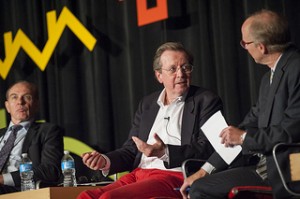Bristol’s Thinking Futures Festival of Social Science kicks off with a debate on the merits or otherwise of directly elected mayors, on 9th November at 6pm in the Watershed. Strengthening city leadership by introducing directly elected mayors is now firmly on the agenda in the UK. Several cities, including Bristol, Leicester, Liverpool, and London already have directly elected mayors. Manchester plans to introduce a ‘metro mayor’ in 2017, with the prospect of other cities to follow. Supporters claim that the mayoral model of governance can provide more visible, more accountable, and ultimately more effective city leadership. Critics argue that the model can lead to an over centralisation of power, weakening the role of councillors, and undermining confidence in local democracy. In this blog, one of the speakers at the event, David Sweeting, discusses the impact of the introduction of a mayoral system of governance in Bristol.
Recently George Osborne announced the creation of a ‘metro-mayor’ for Greater Manchester. In doing so he has joined a long line of heavyweight politicians who have endorsed the idea of directly elected mayors as at least part of the solution to issues in urban governance in English cities. From as far back as Michael Heseltine in the early 1990s, via Tony Blair, and through David Cameron the idea of a single figure to govern our cities has resonated strongly in Whitehall. In the press release on Manchester’s metro-mayor, Osborne is quoted as saying: “This will give Mancunians a powerful voice and bring practical improvements for local people, with better transport links, an Oyster-style travelcard, and more investment in skills and the city’s economy”. The prospect of other cities introducing similar figures is clearly back on the agenda – whether on existing city boundaries or across a city-region.
Continue reading →




 It is nearly a year since the first directly elected mayor of Bristol took office. While Bristol is not the only place in the country to have such a mayor, it was the only one of ten cities that said yes to a mayor in referendums held in May 2012. Despite various inducements from central government in the form of looking favourably at city deals, and also the prospect of a mayors’ cabinet with the PM himself, Bristolians were the only citizens in the country at that time to go for the option of replacing a traditional council leader with what many see as an American style figure at the head of city government. So, as the Mayor of Bristol, George Ferguson, prepares for his
It is nearly a year since the first directly elected mayor of Bristol took office. While Bristol is not the only place in the country to have such a mayor, it was the only one of ten cities that said yes to a mayor in referendums held in May 2012. Despite various inducements from central government in the form of looking favourably at city deals, and also the prospect of a mayors’ cabinet with the PM himself, Bristolians were the only citizens in the country at that time to go for the option of replacing a traditional council leader with what many see as an American style figure at the head of city government. So, as the Mayor of Bristol, George Ferguson, prepares for his 